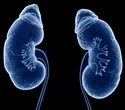Higher levels of specific biomarkers in urine and blood can predict a patient’s risk of developing chronic kidney disease, according to a new study from Johns Hopkins Medicine that examined the long-term effects of hospitalized patients with acute kidney injury (AKI), a sudden but temporary loss of kidney function (CKD).
The research, which was released on March 23 in the Journal of Clinical Investigation, may aid medical professionals in determining whether a patient’s body is recovering appropriately after suffering kidney damage and may even help to stop the progression of AKI to CKD.
The kidneys are two bean-shaped organs that help your body flush out waste and clean your blood. When your kidneys cease functioning properly, AKI can result, which can lead to waste building up.
making it challenging for the body to maintain fluid equilibrium in your blood. AKI may cause CKD, a much more serious and potentially fatal condition, as well as other heart issues, even though it is curable.
AKI is most frequently observed in hospitalized patients whose kidneys have been subjected to stress and complications from medical and surgical procedures, potentially delaying recovery and causing kidney damage for an extended period of time. The United States Centers for Disease Control and Prevention estimate that 37 million Americans have CKD, making it the eighth most common cause of mortality in the nation.
Researchers assessed seven urine and two plasma biomarkers of kidney damage, inflammation, and tubular function at various timepoints across the course of 656 hospitalized AKI patients.





